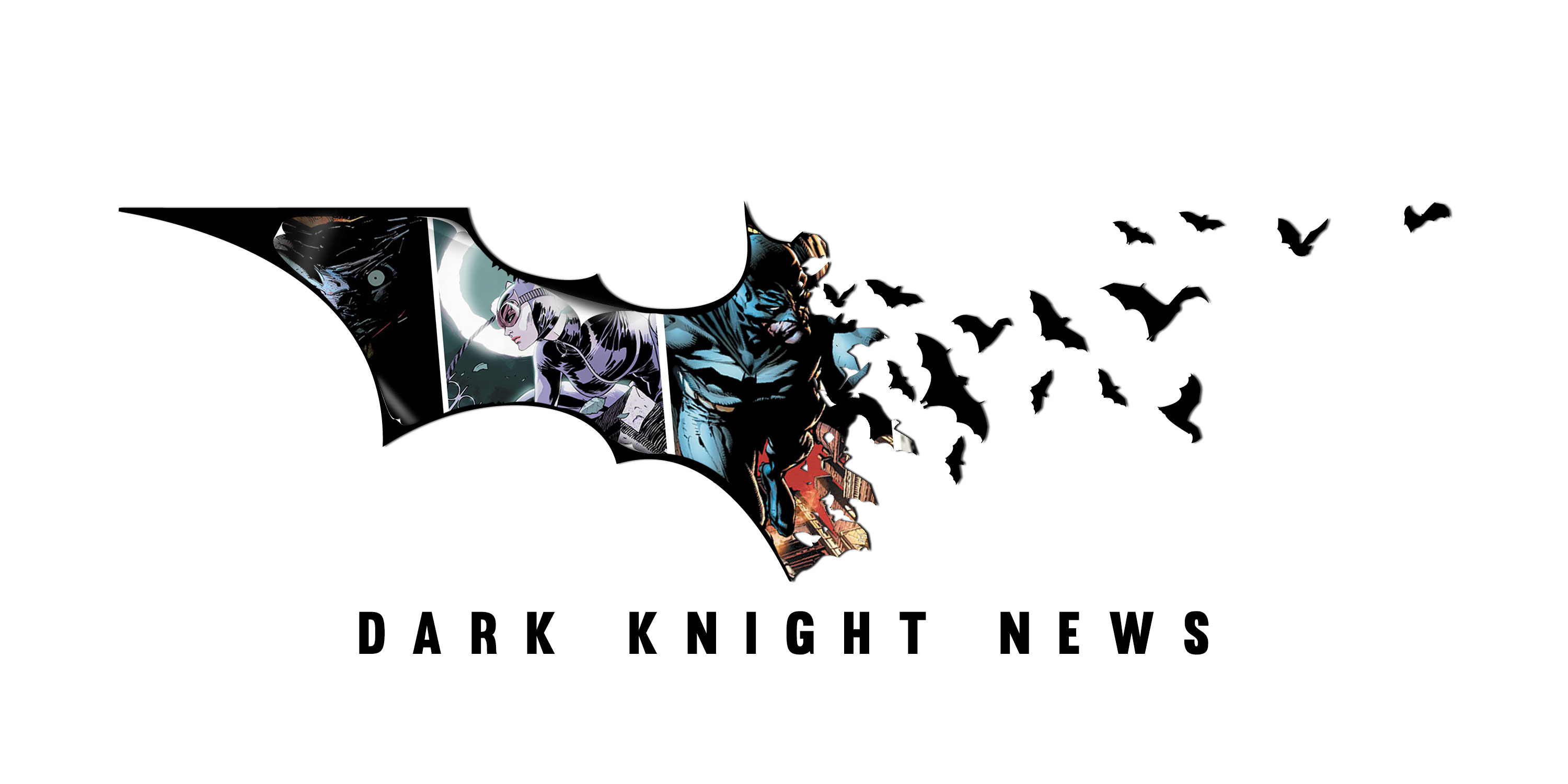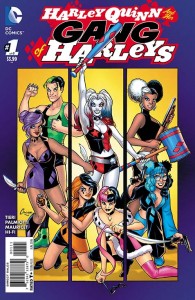It’s probably safe to say that Harley Quinn’s popularity has breached the atmosphere and passed the JLA Watchtower. Merchandise bearing her likeness is everywhere, Suicide Squad hits the silver screen in August, and yet another comic book with her name on the marquee has arrived.
That’s right, this week marks the anticipated release of Harley Quinn and Her Gang of Harleys, a mini-series similar in tone to the solo book, yet with its own flavor and diverse cast (read my review here).
I recently had the chance to speak with co-writers Jimmy Palmiotti and Frank Tieri, which you can read a transcription of below. It had to be one of the funnest interviews I’ve ever conducted, as they not only gave insight into the book, but their humor was also apparent. They’re obviously good friends and it shows in their work. Harley is in good hands.
DKN: Aside from the title of the book, what do you think separates this from Harley’s solo series? And what was it like to work on the script with Frank as opposed to Amanda, Jimmy?
Jimmy Palmiotti: What separates it is we’re almost looking at Harley Quinn from a different point of view. With Gang of Harleys, for me, it was a way to introduce the characters and then see Harley through other peoples’ eyes, especially the eyes of characters who look up to her in a way and what she’s doing in the regular book. So it was a great opportunity to go and do that.
To work with Frank… honestly, I have a Wheel of Fortune wheel that spins and has all the creative names on it. I spun it and it got to “bankrupt.” I lifted up the black card and Frank’s name was on it. But Frank and I are good friends. You know, we have the same sense of humor – a bizarre sense of humor – and I thought this would be a great combo for me and Frank to dig in with the characters and try to make them individuals. The hardest thing to do is to grab seven new characters and throw them all at you at once. Frank and I have individual voices, he and I can pick different characters to write. Hopefully it comes through in the book that these are seven individuals and two writers are trying to do what they can. He was an easy choice, as was the artist, Mauricet. And [with] Hi-Fi on the colors, it was a win-win situation for me all around.
DKN: Frank, did your previous experience with ensembles help when writing for a new team comprised of distinct characters?
Frank Tieri: Yeah, of course. I’ve written team books. When you write team books and, especially in this case, you want to establish each character with their own individual voices. One of the main goals of the series is that here are these new characters, this Gang of Harleys, is to find out who they are individually and hopefully we were able to pull that off. The fact that me and Jimmy have worked together before helps, too, because we have a lot of the same ideas, the same sense of humor, same approach.
JP: Collaboration can be fun with the right people. Frank falls into that category.
FT: Yes, I do.
DKN: Harley has evolved from Joker’s henchgirl to her own woman to leader. What do you think this mini-series means for her character and her personal growth?
JP: I think part of this series is Harley being the leader saying, “Maybe I don’t have as much time as I thought I had being a leader and I need these people to step up, be who they are, and get done with it.” And make her some money.
As much as she’s broken away from the Joker and she’s on her own, she actually has people depending on her for a change. And although she likes this, she also sees the problems that come with this, meaning they sort of lean on her a little too much. We have that in our lives. We have the idea that if we leave the door open, more people come in.
With the Gang of Harleys, in the regular book, it was fun to have them run around for a couple of issues, but then she realized that instead of making less work for herself, she meets seven new people that she needs to help. This series is about stepping up and doing their own thing. That’s also part of Harley’s evolution is figuring out what works for her and what doesn’t work for her. That’s what this series is about.
FT: Well, if you read the first issue, you see that part of what she tries to do is she sets up this fake kidnapping all in an effort to get these girls to step up and to get out of her shadow. Then, at the end it turns into, oh wait, it’s a very real kidnapping when we introduce the character of Harley Sinn. So now they have no choice but to step up for real.
JP: I say “Gang” because Harvey’s in there too.
FT: What did I say? “Girls”?
JP: Yeah, Harvey doesn’t like that. He’ll hit you with a baseball bat.
FT: I’m sure when I see Harvey I’ll keep that in mind.
DKN: Does Harley Sinn have a permanent place in the mythos or is she more so contained to this mini-series?
JP: She definitely is gonna become a permanent character in the books past The Gang of Harleys. And she has a lot to do with the world around Harley and the fun of the mini-series is that we not only introduce her, but where she’s gonna be going from there.
FT: Harley has evolved. She’s gotten more grey; she’s not good, she’s not bad. She’s somewhere in the middle. This character is not grey. She’s a badder version of Harley.
JP: It’s sort of like I’m Harley and Frank is her.
FT: Yes, I’m the Harley Sinn of this book.
DKN: As awesome as the current crop of Harley Quinn comics are, some refuse to read because of changes to her hair color or costume. What do you think of this mindset?
JP: You know, she obviously has a different costume than the Bruce Timm costume. She’s had different costumes over the years. She’ll continue to have costumes. It’s sort of like saying, “I don’t like somebody because of the clothes they wear.”
So I don’t really know how to answer that much, but I will say that deep down the Harley character is the Harley character that Bruce Timm and Paul Dini created and it’s just an evolution. Our book is an evolution of the character, but it’s not a different character. So much so that Bruce and Paul love the book. They told Amanda [Conner] and I many times that they enjoy what we’re doing and they’re happy we’re building on it. That, for us, means everything because those are the creators.
So I think if people choose to not like it because she dyes her hair or wears a different pair of boots, it’s a reflection of them. I can’t make people like something. The best we can do is try to do the best book we can all the time and stay loyal to the character and hope sometime they give it a try.
Once in awhile, you get people on Facebook or Twitter who tell you in a nice way to drop dead, you suck, or something. I always say, “Pick up Suicide Squad, you might like Harley in that book,” or “Pick up the video game, you might like her in Injustice.” There might be a Harley out there for you. I don’t want to deter them from buying Harley, I just want them to understand things change, people change, and characters change. They’ve been doing it since the beginning of comics and, for a character to grow, there has to be change. If it’s the same thing over and over, even the most diehard comic fan will get bored after awhile.
FT: At the end of the day, Harley Quinn is still Harley Quinn. She’s got a different costume. Get over it. Simple as that.
DKN: I try to put the same positive spin on it and people say, “Because she’s not blonde, she’s not Harley.” And I say it’s still the same character. Read the book.
JP: If your husband or wife dyes their hair, it doesn’t make them not the person they were. If we gave her an extra set of arms, I’d see there’s some kind of problem there.
FT: That’s a good idea. You’re spoiling the book now.
JP: Spider-Quinn! All you can do is the best you can and hope the world likes it.
Images appear courtesy of DC Entertainment.






